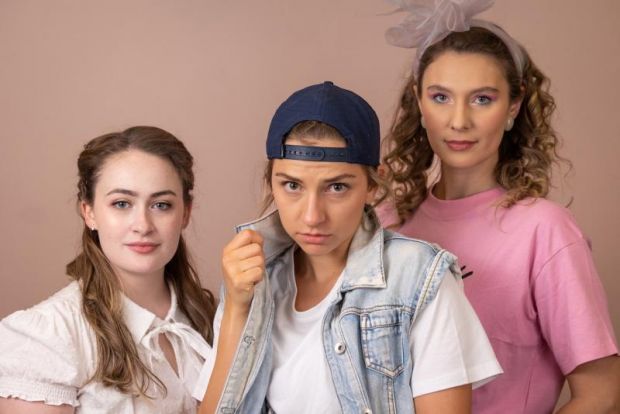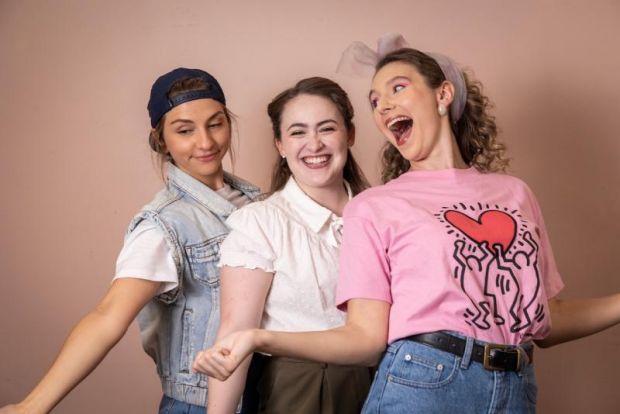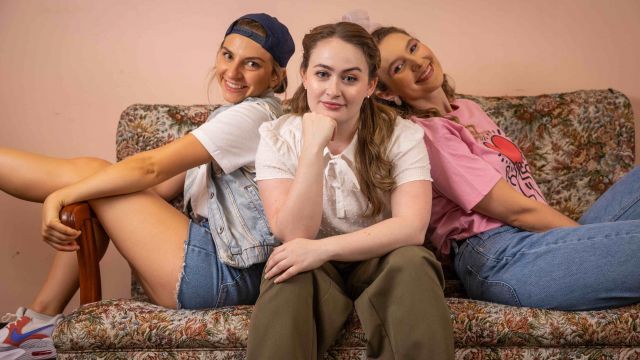Di and Viv and Rose
‘That’s what we’re here for!’ exclaims Viv, when challenged about her one-track mind to complete a first-class honours degree. And yet Amelia Bullmore’s play about three women sharing a house demonstrates that it’s not so much an academic education as one in life. Set in the again-fashionable eighties, the music mashups of New Order, Rick Astley and Talking Heads bookend each scene, the set-up coming episodically as we’re introduced to the three women. Di (Julia Vosnakis), a sporty lesbian – except when she’s with her mum; Viv (Georgia Laity), a militant wordsmith who is determined to change the world; and Rose (Isabel Vanhakartano), a naïve southerner whose new-found sexual experimentation will inevitably change her life.
Each character is well-drawn by the actors – familiar enough that you think you already known what’s coming, yet playwright Bullmore turns the narrative differently, and director Rachel Burke reins them in before they become stereotypes. Vosnakis is brilliant in containing the washing machine of emotions of an 18-year-old living away from home for the first time, with heart-breaking vulnerability in the darker parts of the first act. Laity’s strength is in balancing her determination and need for approval, and in carrying the core philosophy of why we do good things, convincing both when indignant and exposed. And Vanhakartano is wonderful with her exaggerated politeness, and her innocent surprise in the discovery of action and reaction (‘If you ask a boy to go to bed with you, they do’).

Yet it succeeds more for the relationships between them – the tension of Rose’s recklessness whilst Di and Viv long to be as relaxed, the pride each has for the achievements of another – and how these growing friendships intertwine in the first act to create strength that can work through anything that any of them have to deal with. Bullmore’s dialogue uses the individuality of each housemate to coax the audience into critical thinking, without preaching or taking sides, then throws in a fabulous late-night, lip-syncing, air guitar and daggy dancing tribute to a music icon of the era. That spectrum and director Burke’s control of it is slick.
The tightness and pace of that first act isn’t so well maintained in the second, with less certainty about where it’s going. After the careful, clever construction of the complicated but robust tri-partite relationships, the inevitable fractures post-degrees are less confidently shown. The realism is maintained in the struggles of trying to preserve what they had long after they’re no longer living together, and the narrative still surprises, but it relies more on the individual performances rather than the collective, underscoring the evolution of friendships together and apart.

Meg Wilson’s design has enough signals to remind us we start in the 1980s, with cassettes stacked on the shelf and the rotary dial home telephone, and it’s great to revisit a time before mobile phones and internet to ‘solve’ all our communication problems. The sheets-and-pillows ‘fort’ is terrific in not only regressing the three performers back to their childhood solutions, but taking us along with them, emotionally as much as anything else. Antoine Jelk’s sound design keeps us in the right era with some great music; and lighting from Mark Oakley is smartly unobtrusive, using the lounge-room lamps to support the illumination of the performances.
The reputation of Rumpus in producing strong and challenging theatre is extended with this production. Instead of getting sentimental with its nostalgia, it is heart-warming in its exploration of female friendship, but doesn’t hide from the challenges women faced then, underlines how little has changed in forty years, and how shockingly contemporary these issues remain.
Mark Wickett
Photographer: Jamois.
Subscribe to our E-Newsletter, buy our latest print edition or find a Performing Arts book at Book Nook.

